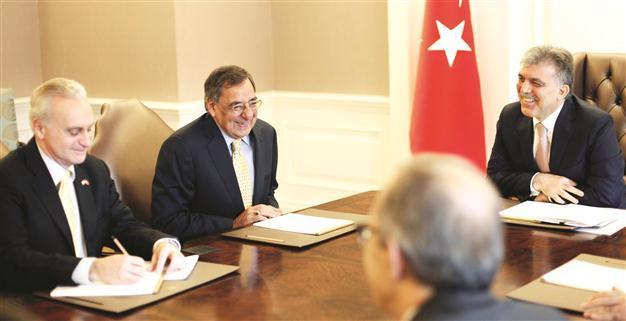Pentagon denies report on base plans in Turkey
WASHINGTON / ANKARA

US Secretary of Defense Panetta (C) met Turkish President Gül (R) in Ankara last month. A daily reported that officials were looking into the creation of US bases in Turkey.
U.S. officials said military leaders were looking into the creation of new special-operations bases in Turkey and eastern Jordan, the Wall Street Journal reported, as part of new U.S. plans of replacing large forces with fast and light special operation units.The report was denied by Pentagon’s spokesperson and was not confirmed by Ankara on Jan. 27. “Reports about additional U.S. force presence in Turkey are false. We have had no such discussions with the Turkish government. The United States military deeply values its close relationship with the armed forces of Turkey, one of our closest allies and NATO partners,” Captain John Kirby, Pentagon’s spokesman said in a statement Jan. 27. The daily, quoting United States officials, reported that military leaders were looking into the creation of new special-operations bases in Turkey and eastern Jordan, near the border with Iraq, adding that those will supplement a network of airstrips and other facilities in the region that house drones and operatives used for missions in Yemen, Somalia and beyond.
Smaller and leaner Army
Turkish Foreign Ministry officials also told Hürriyet Daily News that they had no such information. The U.S. Embassy had said it was “aware of no such plans” concerning the story. “We have had no such discussions with Turkish government,” a U.S. Embassy official in Ankara told Hürriyet Daily News on Jan. 27.
In a press conference with Chairman of the Joint Chiefs of Staff Gen. Martin Dempsey, U.S. Defense Secretary Leon Panetta unveiled a 2013 budget plan that would cut $487 billion in spending over the next decade by eliminating nearly 100,000 ground troops for a “smaller and leaner” military.
Panetta said the U.S. would boost Special Forces and retain the ability to defeat “any enemy on land.” He proposed reducing the number of active U.S. Army soldiers from 570,000 in 2010 to 490,000 by 2017 and reducing the Marines’ strength from 202,000 to 182,000 over the same period, Reuters reported.
Panetta vowed to maintain U.S. power in the Middle East and Asia by modernizing submarines and funding a next-generation bomber. Panetta also called for funding to station littoral combat ships in Singapore and patrol craft in Bahrain, part of the U.S. strategy of forward-deploying its military to strategically placed U.S. allies. The Obama administration called for investment on new projects including a futuristic floating base for special operations and drones and assigning elite Brigade Combat Teams with language training to each region of the world. “Focus would shift from large-scale conflicts in Iraq and Afghanistan to areas of key national interest,” Panetta said.
Among the most ambitious
projects, the budget would fund work on an “afloat forward staging base” – a giant barge that can transport special operations or other forces at quick notice, reducing demands on aircraft carriers. The Pentagon would also boost spending on cyber warfare and unmanned drones, two top U.S. priorities amid disputes with Iran and Pakistan.
















